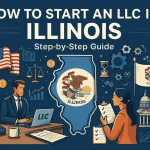Starting an LLC in Florida is a popular choice for entrepreneurs due to reasonable fees and no state income tax on individuals. Here’s how to form your Florida LLC:
1. Pick a Florida LLC Name
Your LLC’s name must be distinguishable from all other entities registered in Florida and include “Limited Liability Company,” or an abbreviation like “LLC.” Check the Florida Division of Corporations’ online search to ensure your desired name is available. You can reserve a name for $25, but because Florida has an easy filing process, many simply skip reservation and go straight to formation once they have a good name.
2. Choose a Florida Registered Agent
Florida requires an LLC to have a registered agent and office in the state. The registered agent can be an individual Florida resident or a Florida business entity (or foreign entity with Florida authorization) that has a physical address (no PO Box) in Florida. They will receive any legal papers for your LLC. You’ll list the agent’s name and address on your Articles of Organization. If you don’t have a person, many companies provide registered agent service in Florida for a fee.
3. File Articles of Organization
File Florida’s Articles of Organization with the Division of Corporations. The filing fee is $125 (which includes a $100 filing fee and $25 registered agent designation fee). You can file online or by mail. The Articles will ask for:
- LLC name,
- Principal place of business address and mailing address,
- Registered agent name and address (and a signature from the agent accepting the designation, which the online form handles via a checkbox if the organizer is filling on their behalf),
- Names and addresses of the LLC’s members and/or managers (Florida requires you to list at least one person—member or manager—who is authorized to manage the LLC),
- The effective date if you want it delayed (optional, can delay up to 90 days),
- Signature of the organizer. Online filings are typically processed within a day or two, and you’ll get a confirmation by email. Mail filings take longer.
4. Obtain an EIN
After filing, get an EIN from the IRS for your LLC. This is important for opening bank accounts, hiring employees, and handling taxes. Even though Florida has no state income tax on individuals, if your LLC has more than one member, it will still file a federal partnership return, and an EIN is needed for that. The EIN application is free and quick on the IRS site.
5. Create an Operating Agreement
Florida doesn’t require an operating agreement, but it’s highly recommended to have one. This document is your LLC’s internal blueprint. It covers ownership percentages, voting rights, profit distribution, and management structure (member-managed or manager-managed). It also lays out the process if someone leaves or if you dissolve the company. Having an operating agreement can help preserve your limited liability by showing you treat the LLC as a separate entity.
6. Open a Business Bank Account in Florida
Open an account in your LLC’s name to separate business finances. You’ll need your EIN and the filed Articles of Organization (the documentation from the state). Keeping funds separate is key to maintaining liability protection. Plus, Florida is known for strong asset protection laws; maintaining formal separation of your LLC’s finances only strengthens that.
7. Florida Business Licenses and Taxes
Florida doesn’t have a general state business license, but depending on your business, you might need specific licenses (e.g., restaurants need health department permits, real estate agents need state licenses, etc.). Check the Florida Department of Business and Professional Regulation (DBPR) for any state-level licenses and your local county/city for local business tax receipts (often called an occupational license). Tax-wise, Florida LLCs with retail sales or certain services need to register for a Sales Tax Permit with the Florida Department of Revenue. If you have employees, register for employer taxes (reemployment tax, etc.). While Florida has no personal income tax, it does have a corporate income tax—but LLCs taxed as partnerships or S-corps typically pass that to individuals (so most LLCs won’t directly pay state income tax, unless you elect C-corp status or have to pay the corporate tax for certain circumstances). Also be aware of the Florida Annual Report.
8. File Your Florida LLC Annual Report
Every Florida LLC must file an Annual Report each year to maintain an “active” status. The report confirms or updates your LLC’s information (registered agent, addresses, member/manager info). The first report is due in the year following formation. The deadline is May 1 each year, and the fee is $138.75 (as of now). If you miss the deadline, there’s a $400 late fee and potential administrative dissolution after a time. The report is filed online on the Sunbiz (Florida Division of Corporations) website. Mark this on your calendar to avoid hefty penalties.
Tip: If you want to ensure your Florida LLC formation and compliance go smoothly, consider using Registered Agents Inc. They will handle your Florida Articles of Organization, provide a registered agent, and can even manage your annual report filings for you. Form your Florida LLC with Registered Agents Inc. and let them take care of the details.
Final Thoughts
Florida is a business-friendly state with straightforward LLC formation and maintenance. Just be sure to keep track of the annual report and any relevant taxes (sales tax, etc.) for your business. With your Florida LLC established, you can enjoy not only the warm weather but also the benefits of operating under an LLC, like liability protection and pass-through taxation (federally). Time to turn your business dreams into reality with your new Florida LLC!
Ready to start your Florida LLC? Don’t wait – form your Florida LLC now and launch your business with confidence!














